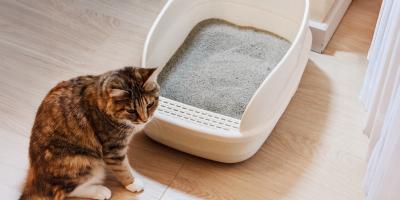Weird Cat Behavior Explained


Ask a cat owner what they love about living with a cat and you're likely in for a long answer. Somewhere among the many reasons why cat ownership is a fun adventure is the simple joy of observing cat behavior.
While their human companions feel like they can sometimes relate to what their cats are feeling and thinking, there are other times where all cat owners can do is scratch their heads and wonder about the strange cat behavior of their feline friend.
Cats Sitting in or on Boxes
If there's one thing cats enjoy, it's sitting on or in boxes. It doesn't matter what kind of box or where it is; if it's there, your cat is probably mulling its viability as a potential hiding space. As they inevitably start to jump, slide or roll into the box playfully, they may be exercising an instinctual need that began with their ancestors, seeking out protected spaces in the wild where they could see their environment without being seen.
Providing boxes and similar objects for a cat to climb into is an inexpensive way to keep them mentally stimulated while enriching the home environment. To make it more fun, try hiding toys in these spaces for your cat to discover.
Of course, always inspect the box and surrounding area to make sure it is safe for the cat and the toys can be easily retrieved from the box.
Cats Sitting on Electronic Equipment
It's a somewhat common occurrence for cat owners hard at work on their laptops to get up for a snack or to stretch and return to find their cat lounging across their keyboard. This odd, yet adorable, behavior has an explanation.
Cats may sit on or near electronics, like computers and TVs because they're warm and have stimulating images on their screens. It's not likely a cat can see precisely what we see on a computer or TV screen, but the movement can engage a cat's natural curiosity.
Cats might lay across a keyboard or sit on a TV to get attention. They interrupt what you’re doing so you’re forced to pay attention to them instead. An excellent way to test this is to see if your cat spends as much time with a device when you aren't engaging with it.
Cats Running Around in the Middle of the Night
"Why is my cat running around like a maniac when I'm trying to sleep?" This is a common refrain from exasperated cat owners. It's a good question: Why do cats run around at night?
Since cats are nocturnal, it's natural for them to be more active at night. Because most people aren't home often during the day, they spend a lot of the daylight hours sleeping. Once the moon is up, they need to expend their pent-up energy, and for cats, running around the house is great fun.
Cat owners who find this behavior problematic or disruptive can curb it by increasing their cat's daytime activity levels. Provide them with engaging feeding toys or establish a playtime routine before leaving the house and after returning. Before you go to bed, play with your cat to help them expend energy and, hopefully, spend more of the nighttime hours sleeping.
Some cat owners also find a feeding routine that supplies cats with more energy during the day instead of at night can also be helpful. Work with your veterinarian before making major adjustments to your cat’s feeding schedule to ensure she’s still getting the right amount of daily calories.
Cats Stealing Food
Some cats steal almost any object they can get their paws on, which might be where we got the expression "cat burglar." A cat stealing food gets attention from their owner for this activity—even if it's negative attention—so they may continue to do it.
The cat's motivation might be hunger, but it's also probably a form of play. Cat owners who think this might be the case should try providing something else for their cat to do. Introduce feeding puzzles, toys to play with, or, even better, establish a playtime routine. This might alleviate any boredom that causes cats to get into trouble.
When cats take objects and move them around—like socks—it may be a predatory instinct. The socks replace prey that has been killed and brought back to the home. Cat owners who believe this behavior is more of a compulsive habit for their cat should seek the help of a cat behaviorist or veterinarian.
Attraction to Water
Many cats love water, although they don't have a reputation for it and certainly don't respond to it the same way dogs do. Cats prefer to approach water on their terms, however, and often dislike having it imposed on them.
When it comes to drinking water, cats are often attracted to running water or water droplets because that's how they would interact with it in nature. Still water in a bowl may be less likely to gain their attention.
Pet owners worried about their cat being properly hydrated should try experimenting with ways to give their cat access to running or dripping water. Incorporating wet food into a cat’s diet can also help increase hydration levels.
This is just the tip of the iceberg when it comes to decoding cat behavior. For more insight into cat behavior and more, delve into our Pet Expertise page and see what our experts have to say.

Earn myPurina Rewards with Every Purchase
Use your points for treats, toys, and gift cards with myPurina app.






